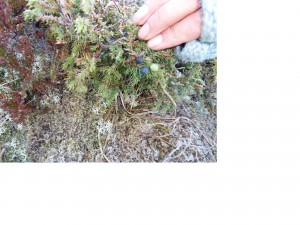Boreal bliss in Assynt
,
It was icy cold on Thursday 13th December when we set off on our seed collection walk for the Little Assynt Tree Nursery. There was snow on the high ground with a white sprinkling everywhere and the ground was frozen solid, it was really beautiful in the low winter sun. We had heard of a particularly good area of Juniper growing in a very remote part of Assynt. The landscape was spare and empty but about half way along we got a fantastic sighting of a golden eagle as it soared above us. Before disappearing behind a nearby hill we watched as it fingered the air in silence. The frozen conditions made the going slippy, but after an hour or so we revived ourselves with a welcome flask of coffee.
Among the white hoar frost we found an abundance of Juniper clinging to rocks and in crevices. There were many green berries and some ripe black berries which we picked. Juniper regenerates where there is less vegetation and often clings to the high rocks where nothing else can grow. It was cold work picking with bare fingers amongst the prickles. Juniper has been growing here for perhaps seventy years or more; there is a loch nearby named after the plant in Gaelic. Juniper is hard to age as these prostrate shrubs are slow growing.
Juniper is one of the three conifer species native to Britain; it arrived after the last ice age 10,000 years ago and has been used for years to flavour gin. The berries may also be used to spice soups, stews and cakes. The wood is of less value but in the past was used for burning in illicit whisky stills due to its smokeless quality. Today the shrub is popular in mixed woodland planting schemes as it increases biodiversity. We found proof of this while we were picking as we came across a caterpillar under one shrub and some of the berries had been eaten perhaps by a mouse or the waxwing we spotted on the way home. These shrubs also make perfect nesting sites.
Once collected we will extract the seeds from the berries and then stratify them in sand and gravel. Juniper is notoriously slow growing but eventually we hope to have lots of young plants for sale and who knows, perhaps locally flavoured gin will be available in a few years! Romany
Juniper berries on a low-growing shrub….prickly work!

